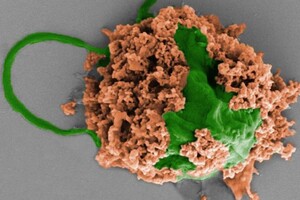Scientists hope they can help treat people.

Scientists from the University of California in San Diego developed tiny floating robots that were able to clean the lungs of mice from bacteria that cause pneumonia. Researchers hope that such robots can be used to treat people in the future, reports Science alert.
The robots are made of algae cells and covered with a layer of antibiotic nanoparticles. Algae provide movement through the lungs, allowing for targeted and effective treatment.
Also read: Lack of sleep can damage immune system – scientists
Nanoparticles on algae cells are made up of tiny polymer spheres covered with membranes of neutrophils, the type of leukocytes. These membranes neutralize inflammatory molecules produced by bacteria and the body's own immune system. Nanoparticles and algae decompose naturally.
During the experiment, all mice treated for pneumonia with the help of robots recovered. Those who did not receive treatment died.
According to scientists, treatment with the help of robots was more effective than intravenous injection of antibiotics. In this case, the dose of the antibiotic should be 3000 times greater than in the case of using microrobots.
In the future, the researchers plan to conduct more experiments to find out how such robots interact with the immune system. After that, it will be possible to move on to research on large animals and, possibly, humans.
Related video
Previously scientists used methods of physical influence on chromosomes in living cells. As a result, they came to the conclusion that outside the phases of cell division, chromosomes are liquid, “almost liquid”.




